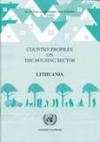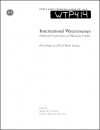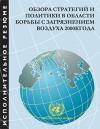Publications
Displaying Results 1941 - 1960 of 2840
- English
This study on the Lithuania's housing sector is the fourth carried out by the ECE Committee on Human Settlements to analyse housing sector reform in countries with economies in transition. These country- specific strategic housing sector analyses are intended to assist the Governments of countries with economies in transition in improving performance in this sector.
- English
The report is the first EPR of Kazakhstan. The review team included national experts from Finland, France, Denmark, Germany, Romania, Slovakia, Slovenia, Spain and Uzbekistan, together with the ECE secretariat, UNEP and the Bilthoven Division of the WHO European Centre for Environment and Health. The costs of the participation of experts from countries in transition, as well as the travel
- English
This report is about the 1st EPR of Kyrgyzstan. The review team was constituted following these decisions and included national experts from Armenia, Belgium, Denmark, Germany, Switzerland and the Russian Federation, together with the ECE secretariat, experts from the International Strategy for Disaster Reduction (ISDR), the United Nations Environment Programme (UNEP) and from the Bilthoven
- English
Symbol No. ECE/TRADE/255 more details: [email protected]
- English
UN Sales Number: E.99.II.E.40 ISBN: 92-1-116741-8 Languages: E
- English
This publication is an assessment of the implementation of human settlement policies on urban renewal and housing modernization in Budapest. It presents the overall conditions for urban renewal in Hungary, the urban renewal strategies in Budapest and in other specific districts. The publication also analyzes the existing policies, the housing problems and the tenure categories. UN Sales
- English
A first Environmental Performance Review of Bulgaria had been undertaken in 1995 as a joint project between ECE and OECD. In September 1999, the UNECE Committee on Environmental Policy agreed to the Bulgarian request for a second review by UNECE. The project was the first second-round review of the EPR programme in a country in transition. The review team included national experts from Denmark
- English
This work was originally published by the World Bank in English (World Bank Technical Paper No. 414; 1998). The Russian translation contains additional texts, such as the Protocol on Water and Health to the 1992 Convention on the Protection and Use of Transboundary Watercourses and International Lakes.ECE/MP.WAT/3United Nation New York and Geneva, 2000 Special edition
- Pусский
Женева, 2000Readmore
- Français
Genève, 2000Readmore
- Español
SBN 9036953154 (edición original en inglés) Lelystad (Países Bajos), marzo de 2000Download this Publication
- English
Explains what is meant by electronic commerce and addresses the issue of the convergence of business and technology and the work of the UN/CEFACT towards electronic business. It also outlines the importance of the simplification of administrative constraints and provides examples of the use of electronic commerce to improve administration
- English
This case study provides an analysis of the implementation of the urban renewal and housing modernization policies that are currently being pursued in Ljubljana. In its firts part, it describes current housing conditions in Slovenia. The subsequent parts present a description of the present state of Ljubljana housing stock followed by conclusions and recommendations.
- English
- English
This is the first EPR of Armenia. The review team for the project was constituted and included national experts from Bulgaria, Croatia, Denmark, Slovakia and the Russian Federation, together with the ECE secretariat, experts from UNEP and from the Rome Division of the WHO European Centre for Environment and Health. The costs of the participation of experts from countries in transition, as well
- English
Disclaimer: The above-listed publications are not official documents of the United Nations Economic Commission for Europe (UNECE). They have not been endorsed by UNECE, the Meeting of the Parties to the UNECE Aarhus Convention, or any of its subsidiary bodies. UNECE assumes no responsibility for the absolute accuracy of the information presented in these publications; nor for









